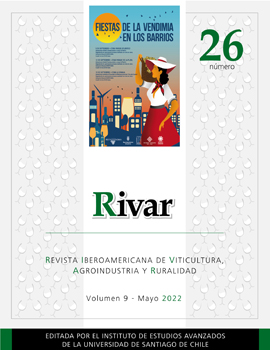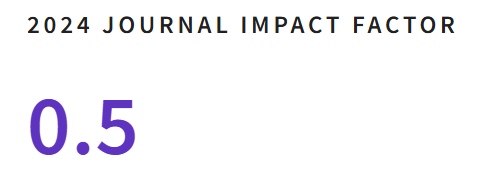Tourist Events Based on Food Heritage: State of Knowledge for Latin America
DOI:
https://doi.org/10.35588/rivar.v9i26.5522Keywords:
tourism, cultural heritage, social agencyAbstract
Traditionally, the study of tourist events has been carried out from different disciplinary approaches, among which management, economics, and anthropology stand out. This has contributed to the formation of a body of knowledge where theoretical and methodological approaches converge that have promoted a progressive understanding of the object of study. The biocultural diversity of Latin America, evident through its food heritage, has led to the implementation of events as a means to value this type of heritage. Despite its relevance to the subcontinent, research on these types of events is not notable in the scientific literature. Therefore, the objective of this article is to identify trends and research gaps in the construction of knowledge about tourism events based on food heritage in Latin America. This study presents a bibliometric analysis and a systematization of the research lines developed up to now. The analysis carried out allowed us to recognize that there is a need to deepen the role of the agency of the local actors involved in this type of event since apart from fulfilling an economic function, its action is linked to the management and operation of the events allows strengthening the social fabric.
Downloads
References
Arias, IR. (2020). “Conexión de la gastronomía con los eventos culturales en Bogotá”. Sosquua. Revista Especializada en Gastronomía 2(1): 37-47. DOI https://doi.org/10.52948/sosquua.v2i1.137
Barczsz, D. y do Amaral, F. (2010). “Turismo gastronômico: a percepção do turista na 18° Festa Nacional do Carneiro no Buraco de Campo Mourão Estado do Paraná”. Patrimônio: Lazer & Turismo 7(11): 66-98.
Bergesio, L. y Montial, J. (2010). “Declaraciones patrimoniales, turismo y conocimientos locales. Posibilidades de los estudios del folklore para el caso de las ferias en la quebrada de Humahuaca (Jujuy-Argentina)”. Trabajo y sociedad 14(15): 19-35.
Borges, S. y de Sevilha, M. (2019). “Motivación hedónica, motivación eudaimónica y apego al lugar. Un estudio en el Festival Cultura y Gastronomía de Tiradentes, Brasil”. Estudios y Perspectivas en Turismo 28(3): 652-674.
Bortnowska, K. y Alberton, A. (2015). “Comida local y memoria gustativa. El Tirolerfest de Treze Tílias (Brasil)”. Estudios y Perspectivas en Turismo 24(3): 718-736.
Campos, A. y Favila, H. (2018). “Culturas alimentarias indígenas y turismo. Una aproximación a su estudio desde el control cultural”. Estudios y Perspectivas en Turismo 27(2): 194-212.
Carvache, M.; Carvache, O.; Carvache, W. y Villagómez, C. (2020). “Festivales gastronómicos para el desarrollo de un destino”. Revista ESPACIOS 41(1): 19-33.
Ceretta, C. (2012). “Eventos de marca: evidências de valor turístico na gastronomia regional do Rio Grande do Sul/Brasil”. Rosa dos ventos 4(1): 89-99.
Ciliane, C. y da Silva, D. (2012). “El festival del bacalao como manifestación de la gastronomía portuguesa en Pelotas, Brasil”. Estudios y Perspectivas en Turismo 21(6): 1558-1577.
Cuba, X. (2020). “Turismo gastronómico en Perú roles de agentes involucrados”. Revista Científica Investigación Andina 19(2): 102-109.
Cuyate, R.; da Costa, EA. y Mariani, MAP. (2014). “Las fiestas como estrategias de implementación de la actividad turística con base local. Reflexiones sobre el Asentamiento 72, Ladário-MS, Brasil”. Estudios y perspectivas en turismo 23(2): 305-326.
De Lima Medeiros, M. y dos Santos, EM. (2009). “Festivais gastronômicos em Belo Horizonte-MG: considerações sobre os reflexos gerados nos empreendimentos envolvidos”. CULTUR: Revista de Cultura e Turismo 3(2): 81-93.
Dos Santos, FG. y Bastos, S. (2016). “O papel do festival gastronômico de Taquaruçu na definição da gastronomia de Tocantins/TO”. Turismo-Visão e Ação 18(3): 611-632.
Erig, GA.; Dutra, VC.; da Conceição Oliveira, KM. y da Silva Morais, FA. (2021). “Turismo, gastronomia e desenvolvimento regional: um estudo sobre o Festival Gastronômico de Taquaruçu em Palmas, Tocantins”. Ágora 23(1): 135-153.
Gastal, S. y Costa , A. (2020). “El diálogo entre la comida nuestra, la comida de ciudad y la comida turística”. Estudios y Perspectivas en Turismo 29(2): 539-560.
Getz, D. (2010). “The Nature and Scope of Festival Studies. International Journal of Event”. Management Research 5(1): 1-45.
____. (2008). “Event Tourism: Definition, Evolution, and Research”. Progress in Tourism Management 29(3): 403-428. DOI https://doi.org/10.1016/j.tourman.2007.07.017
Gomes, A. (2012). “Turismo de eventos. Un análisis del impacto económico en el comercio de la ciudad de Barretos (Brasil) durante la fiesta del peón rural”. Estudios y perspectivas del turismo 21(6): 1594-1608.
Gómez, MC. y Rocha, MIM. (2018). “Turismo gastronómico del cacao y el chocolate, tendencias latinoamericanas”. Gran Tour 18: 58-76.
Guerreiro, B. y Bridi, G. (2015). “Eventos gastronômicos como vetores para o desenvolvimento turístico. Um estudo de caso da Fenadoce Pelotas-RS”. Fólio-Revista Científica Digital-Jornalismo, Publicidade e Turismo 1(1). DOI https://doi.org/10.15602/1981-3422/folio.n1p17-35
Jepson, A. y Clark, A. (2016). “An Introduction to Planning and Managing Communities, Festivals and Events”. En Jepson, A. y Clark, A. Managing and Developing Communities, Festivals and Events. Londres, Palgrave Macmillan: 3-15.
Kim, S.; Savinovic, A. y Brown, S. (2013). “Visitors’ Motivation in Attending an Ethnic Minority Cultural Festival: A Case of Study of the Festa Croatian Food and Wine Festival, South Australia”. Event Management 17(4): 349-359. DOI https://doi.org/10.3727/152599513x13769392444828
López, T.; Uribe, CP; Muñoz, G. y Ríos, I. (2016). “Perfil sociodemográfico, valoración de atributos y nivel de satisfacción. Estudio de Festivales gastronómicos, Guayaquil, Ecuador”. Revista Venezolana de Gerencia 21(76): 674-692. DOI https://doi.org/10.31876/revista.v21i76.22155
Minasse, MH. y dos Santos, BP. (2019). “Da Festa do Vinho à Expo São Roque: a trajetória dos eventos gastronômicos de São Roque (SP)”. RITUR-Revista Iberoamericana de Turismo 9(2): 68-86.
Molina, M. (2013). “El papel del turismo de eventos en el desarrollo urbano. El caso de expo Zaragoza”. PASOS Revista de Turismo y Patrimonio Cultural 11(1): 57-71. DOI https://doi.org/10.25145/j.pasos.2013.11.004
Morales, SYA.; González, MV.; Villacis, JQ. y Leon, RP. (2015). “Situación higiénico-sanitaria de las ‘Huecas’ participantes de la Feria Gastronómica Internacional Raíces 2014”. Ciencia Unemi 8(16): 68-76.
Muñoz, G.; Uribe, C.; Pérez, J. y Ríos, I. (2017). “Festivales gastronómicos y turismo en Latinoamérica. El festival raíces de Guayaquil, Ecuador”. Rosa dos Ventos 9(3): 356-376.
Nega, D. (2019). “Challenges and Opportunities of Managing Festival Tourism for Sustainable Tourism Development: The Case of the Ashendye Festival, North Wollo, Ethiopia”. African Journal of Hospitality, Tourism and Leisure 8(2): 1-12.
Rodríguez, LM. y Quiroga, IA. (2020). “Patrimonio gastronómico de la Provincia de Yariguies (Santander, Colombia)”. Jangwa Pana 19(2): 219-244. DOI https://doi.org/10.21676/16574923.3478
Santos, V. y da Silva F. (2021). “Eventos gastronômicos: um estudo de caso sobre o festival de Queijo Coalho De Jaguaribe-Ceará”. Conexões-Ciência e Tecnologia 15: 1-7. DOI https://doi.org/10.21439/conexoes.v15i0.1253
Serrato, MA.; Rayas, VM. y Murillo, RT. (2010). “La cultura gastronómica p’urhépecha como un gran activo turístico en Michoacán”. PASOS. Revista de Turismo y Patrimonio Cultural 9(4): 681-689. DOI https://doi.org/10.25145/j.pasos.2011.09.064
Suzuki, GDS.; Burkowski, R. y Mesquita, JMC. (2015). “Eventos gastronômicos e estratégias de marketing: o Festival Comida Di Buteco em Belo Horizonte, MG”. Rosa dos ventos 7(2): 242-256.
Troncoso, CA. y Arzeno, M. (2020). “Polos, ferias y mercados: geografía del consumo gastronómico en Buenos Aires (Argentina)”. Revista Universitaria de Geografía 29(2): 95-132.
Vidal, AB. (2017). “El festival del chocolate como estrategia de promoción del turismo cultural en el Estado de Tabasco, México”. International Journal of Scientific Management and Tourism 3(2): 501-512.
Villalva, M. e Inga, C. (2021). “Saberes ancestrales gastronómicos y turismo cultural de la ciudad de Riobamba, provincia de Chimborazo”. Revista Chakiñan de Ciencias Sociales y Humanidades 13: 129-142. DOI https://doi.org/10.37135/chk.002.13.08
Downloads
Submitted
2022-05-22Published
Versions
- 2024-08-16 (2)
- 2022-05-22 (1)









